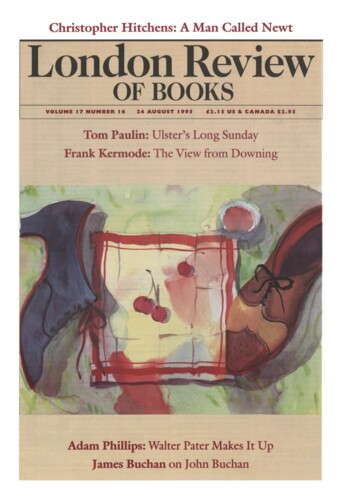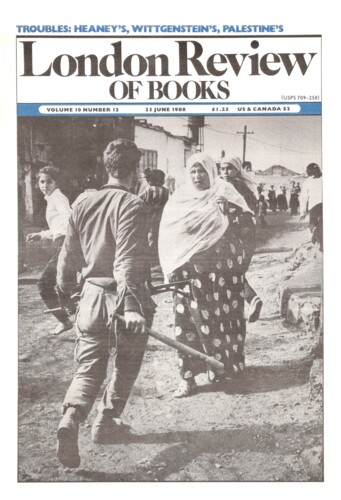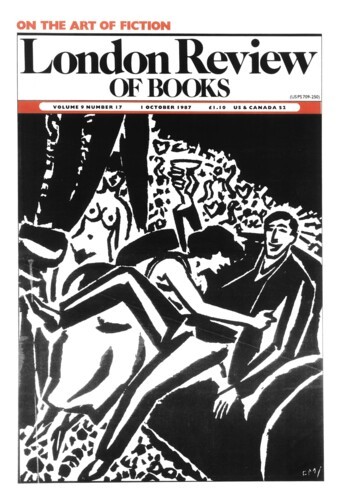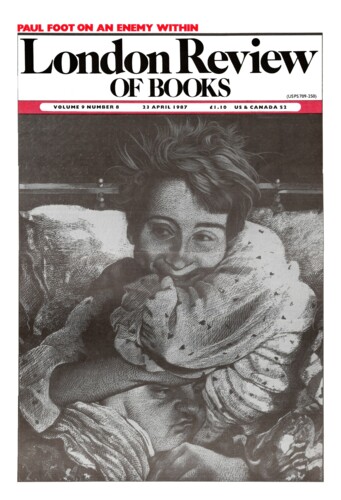Peter McDonald
Peter McDonald is a Junior Research Fellow at Christ Church, Oxford. His work was featured in New Chatto Poets last year, and he was the recipient of a 1987 Gregory Award.
Enid’s Scars
Peter McDonald, 23 June 1988
The title of Joyce Carol Oates’s new novel is well-chosen, being itself both a fragment of popular culture (‘As time goes by’ seems to be lodged there pretty firmly by now) and an imperative which forces readers towards a confrontation with the very past to which it belongs. Throughout the book, this double-take makes itself felt: the industrial USA of the Fifties is insistently present in Oates’s story of a family going through a more than averagely traumatic 12 years, but present also, beneath the surface, is an awareness of the problematic status of the events as memory, as parts of a history that can continue to influence, or infect, the present. The novel’s Prologue and Epilogue, as well as its three titled parts, are dated by Oates with textbook precision between November 1944 and May 1956, taking in the chilhood and adolescence of Enid Stevick, one of four children of a second-hand furniture salesman from New York State. This history circles around crucial, scarring events in Enid’s life: the sexual abuse from her father’s brother that turns into a dangerous love-affair, a clear-headed and almost successful suicide bid and a hurriedly arranged back-street abortion. Along the road, sisters marry or go brazenly into show business, a brother goes to Korea and comes back disfigured and radical, while Enid’s father buys a television, watches the news, and before long has built an underground nuclear shelter in the backyard. Crime hovers around the edges, in the shady business connections of Enid’s uncle and lover, Felix, and violence is everywhere, whether in the boxing ring of which Uncle Felix is a veteran, the tough neighbourhood where the Stevicks live, the crippling war in Korea, or in the bedroom where Enid and Felix make love. In the world of this novel Oates makes it difficult to forget how comprehensively and disturbingly the fundamental things continue to apply.
Between Kisses
Peter McDonald, 1 October 1987
A line running with its own logic from the Biblical wilderness to the theme-park; a link between motel-chains, breakfast cereals, Walt Disney and cryonic freezing: connections of this kind are impossibly eccentric, demonstrable only in the special surroundings of highly-coloured fiction provided by Max Apple’s The Propheteers, which makes them into the threads of a very uncomfortable web indeed, one in which post-war American society is caricatured with remorseless precision, its values inflated into religious terms that seem ludicrous only at first. The book projects the visionary nature of the marketplace, the apotheosis of the entrepreneur, the patriarchal grandeur of the major corporations, and takes this religion seriously enough to understand the raptures of its more mystical reaches, its dream of pure consumerism, pure wealth, pure leisure and, of course, the life eternal. To do all this you need an extraordinary plot, and a canvas so big that the minute gradations of psychological realism are lost in its sweep, an animated cartoon rather than close-up naturalism. And on all the usual plot-and-character counts, The Propheteers is well out of step with more orthodox, and on the face of it more ‘serious’, attempts to get to grips with the candyfloss nightmare of modern America.
MacNeice and Ireland
23 April 1987
Pieces about Peter McDonald in the LRB
The Ticking Fear: Louis MacNeice
John Kerrigan, 7 February 2008
As Louis MacNeice lay dying in 1963, his last major work, a radio play called Persons from Porlock, was broadcast by the BBC. It is about a painter called Hank, who starts well in the 1930s, but...
Accidents of Priority
John Redmond, 22 August 1996
Famous poems, like faces, are a particularly memorable kind of introduction to the person they conceal. Like other kinds of introduction, they are often what we remember a person for, or what we...
Read anywhere with the London Review of Books app, available now from the App Store for Apple devices, Google Play for Android devices and Amazon for your Kindle Fire.
Sign up to our newsletter
For highlights from the latest issue, our archive and the blog, as well as news, events and exclusive promotions.




